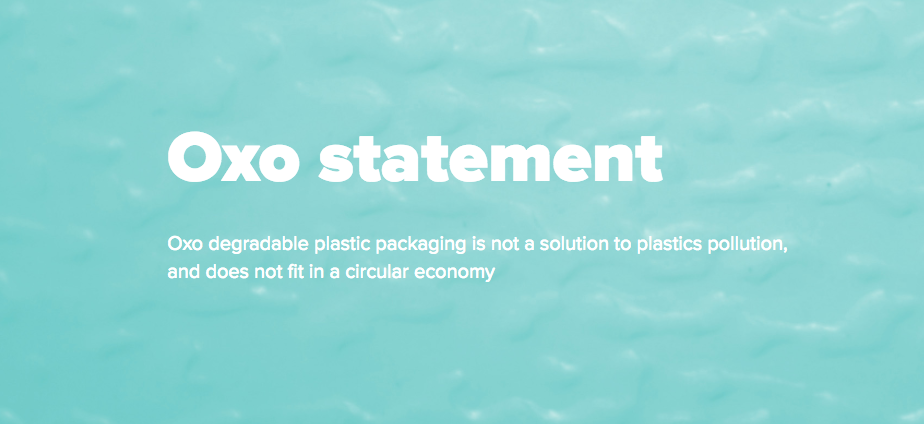
Oxo statement, New Plastics Economy, 2017
Oxo-degradable plastics are being produced and sold in many countries, with society being led to believe they safely biodegrade in nature. Yet significant evidence suggests oxo-degradable plastics do not safely biodegrade but fragment into small pieces, contributing to microplastics pollution.
The Ellen MacArthur Foundation’s New Plastics Economy initiative has published a statement calling for a ban on oxo-degradable plastic packaging. Signatories include European Bioplastics (EUBP), M&S, PepsiCo, Unilever, Veolia, British Plastics Federation Recycling Group, Gulf Petrochemicals and Chemicals Association, Packaging South Africa, World Wildlife Fund (WWF), Plymouth Marine Laboratory, and ten Members of the European Parliament. In total, over 150 organisations, including leading businesses representing every step of the plastics supply chain, industry associations, NGOs, scientists, and elected officials have endorsed the statement calling for global action to avoid wide-scale environmental risk.
“The available evidence overwhelmingly suggests oxo-degradable plastics do not achieve what their producers claim and instead contribute to microplastic pollution. In addition, these materials are not suited for effective long-term reuse, recycling at scale or composting, meaning they cannot be part of a circular economy,” says Rob Opsomer, Lead for Systemic Initiatives at the Ellen MacArthur Foundation.
As a result of the significant body of evidence raising concerns about the potential negative impacts of plastic fragments from oxo-degradable plastics, an increasing number of companies and governments have started to take action to restrict their use, in particular in Europe. For example, in the UK retailers such as Tesco and the Co-operative stopped the use of oxo-degradable plastics in their carrier bags. France banned the use of oxo-degradable plastics altogether in 2015.
However, oxo-degradable plastics are still produced in many European countries, including the UK, and marketed across the world as safely biodegradable. Several countries in the Middle-East and Africa, including the United Arab Emirates, Saudi Arabia, areas of Pakistan, Yemen, Ivory Coast, South Africa, Ghana and Togo, are still promoting the use of oxo-degradable plastics or have even made their use mandatory. To create a plastics system that works, the Ellen MacArthur Foundation’s New Plastics Economy initiative, together with the signing organisations, supports innovation that designs out waste and pollution, and keeps products and materials in high-value use in line with the principles of a circular economy.
Note: Oxo-degradable plastics should not be confused with compostable plastics that comply with international standards and can be safely biodegraded through (industrial) composting.
You can read the full statement here.